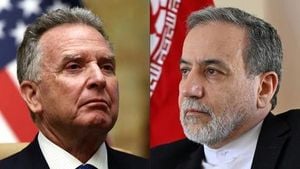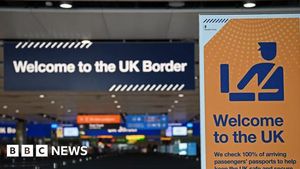Friedrich Merz was elected as Germany's chancellor in a second-round parliamentary vote on Tuesday, May 6, 2025, after a surprising setback during the first round. The 69-year-old leader of the center-right Christian Democratic Union (CDU) secured 325 votes, surpassing the 316 needed for a majority in the Bundestag. This came after only 310 members supported him in the initial vote, marking a historic moment in German politics where a would-be chancellor failed to gain the necessary backing on the first attempt.
Following the successful vote, Merz was officially appointed chancellor by German President Frank-Walter Steinmeier later that afternoon. The German Dax stock market index reacted positively to the news, though it remained 0.4% lower by 3:22 p.m. London time.
Merz's ascension to the chancellery was anticipated after his party won the largest share of votes in Germany's federal election held in February 2025. The CDU, along with its Bavarian sister party, the Christian Social Union (CSU), formed a coalition government with the center-left Social Democratic Party (SPD), which came in third during the election. The coalition agreement, formalized on May 5, 2025, outlines key policies on migration, tax reforms, and social security measures, including the introduction of a minimum wage.
The new government has already announced its cabinet picks, which include designated Vice Chancellor and Finance Minister Lars Klingbeil, incoming Economy Minister Katherina Reiche, and designated Foreign Minister Johann Wadephul. This coalition is expected to navigate a series of challenges, including a sluggish economy, migration tensions, and geopolitical issues stemming from the ongoing Russia-Ukraine conflict.
Merz's political career is notable for its unusual trajectory. Despite having never held a significant government office, he is now the oldest chancellor to take office since Konrad Adenauer, the first post-war German head of government. His background includes a law degree and extensive experience in both politics and business, having held senior positions at major corporations, including BlackRock Germany.
His tenure as a member of the European Parliament from 1989 to 1994 and subsequent years in the Bundestag have shaped his political views, particularly his stance on Germany's relationship with the United States. Merz is often described as a "trans-atlanticist, friend of Europe, and reformer," a characterization that may prove beneficial as he leads Germany through a complex political landscape.
However, Merz's path to leadership has not been without obstacles. His failure to secure enough votes in the first round raised questions about his ability to unify the coalition partners. Analysts noted that this initial defeat could exacerbate mistrust among coalition members and hinder the government's stability at a time when Europe is looking to Germany for strong leadership.
Carsten Brzeski, ING's global head of macro, commented on the situation, stating that while the coalition's fiscal package aimed at boosting infrastructure and climate investments was a "strong and impressive start," subsequent political missteps could undermine these efforts. He remarked, "Unfortunately, what has since followed has been a series of slip-ups and sometimes clumsy political moves." Merz now faces the challenge of restoring economic strength while keeping his coalition aligned.
As he steps into his role, expectations are high. The coalition agreement includes ambitious plans for economic revitalization, such as reducing corporate taxes and increasing military spending in response to the ongoing war in Ukraine. Merz's commitment to supporting Ukraine was underscored during an hour-long TV interview in which he discussed continuing military aid, including the potential delivery of Taurus cruise missiles to Ukraine, a move that would mark a significant shift in Germany's defense policy.
Despite these bold statements, Merz's approval ratings have suffered since the election, with the far-right Alternative for Germany (AfD) gaining ground in recent polls. This shift has prompted the coalition to incorporate stricter immigration policies and a greater focus on internal security in their agreement, a response to the AfD's rising influence.
In the wake of his election, Merz expressed a desire to restore confidence among the German populace. He stated, "We are a great country of more than 80 million people, who live and work here and take care of their families," emphasizing the importance of demonstrating that efforts to improve the country are worthwhile.
As Merz prepares for his first official trip as chancellor to France and Poland, he faces the dual challenge of addressing domestic issues while navigating international relations, particularly with the United States under President Donald Trump, who recently announced sweeping tariffs that threaten Germany's economic stability.
The coalition's ability to work cohesively will be tested in the coming months as it tackles pressing issues, including the fallout from the Russia-Ukraine war and economic challenges exacerbated by global tensions. Political analysts remain cautiously optimistic about Merz's leadership, noting his experience and connections within Europe may help stabilize Germany's role on the continent.
In summary, Friedrich Merz's election as chancellor marks a pivotal moment for Germany, as he embarks on a challenging journey to lead a coalition government amid significant political and economic hurdles. His ability to navigate these complexities will determine not only his legacy but also Germany's future in a rapidly changing world.




